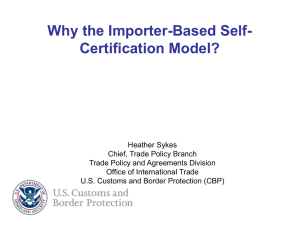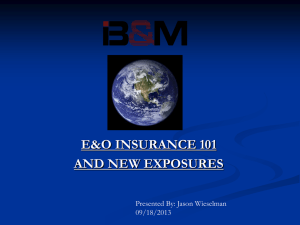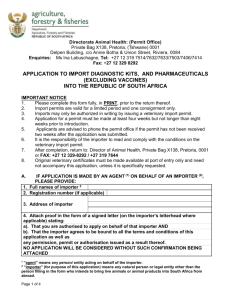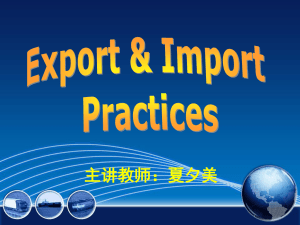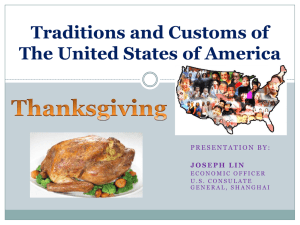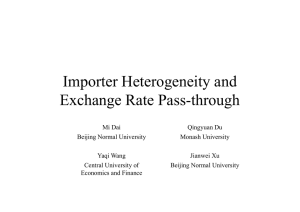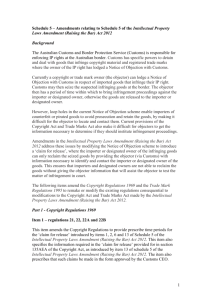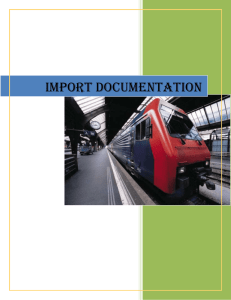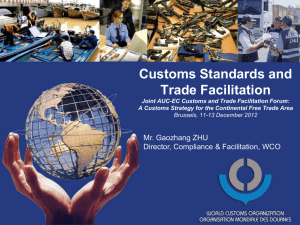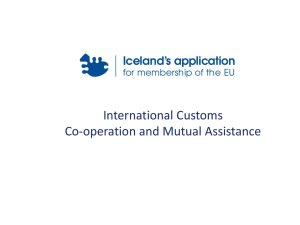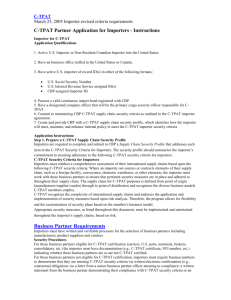a firm that provides help to companies with the logistics of getting
advertisement
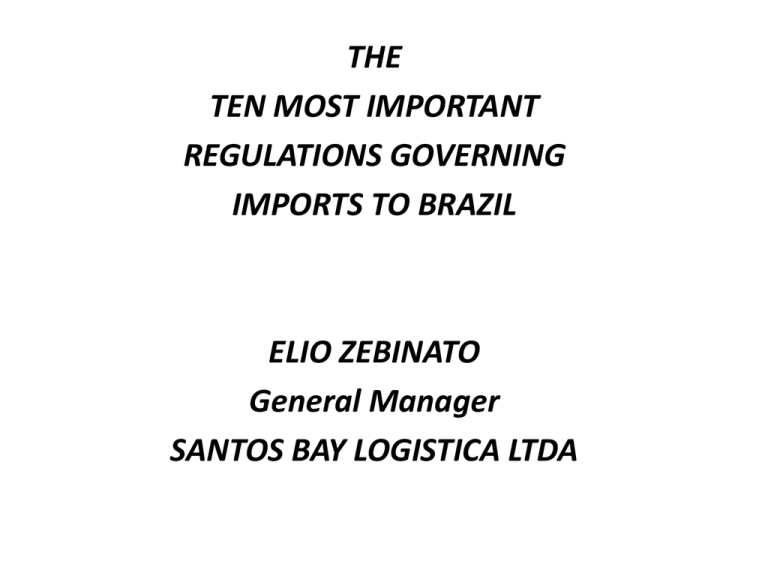
THE TEN MOST IMPORTANT REGULATIONS GOVERNING IMPORTS TO BRAZIL ELIO ZEBINATO General Manager SANTOS BAY LOGISTICA LTDA 1 – TO OPERATE IN FOREIGN TRADE – Imp/Exp. All the importers and Exporters have to be registered with The Federal Revenue Department to operate on the Integrated Foreign Trade System called “SISCOMEX”. The importer or Exporter can operate on the “SISCOMEX” on his own account or through a license customs broker. 2 - IMPORT LICENSE • As a general rule, licenses are waived for the Brazilian importers, however; some goods are subject to licenses based on NCM (HTC). • The NCM classification codes are made up of eight numbers and are compatible with the Harmonized System (HS) the standard international classification. • Based on the NCM through the SISCOMEX, we will know if the Import License is required. • Once the importer applies for the import license it can take up to 60 days to be approved and has the validity for 90 days for the shipment to occur. • The Import License has to be filed and approved prior to the shipment of the goods. • Any import license approved or filed after the shipment of the goods are subject to a fine. • The fine can be from R$500.00 (USD.250.00) to R$5.000,00 (USD.2,500.00). 3 – THE SHIPMENT – (BILL OF LADING) • Carriers must declare via Electronic Data Transmission (EDI) called SISCARGA (Manifest System for Brazilian Customs) 48 hours prior to the vessel arriving at the first Brazilian port of call. • Any change made on the B/L after the 48 hours mandatory transmission time are subject to a fine of R$5,000.00 (USD 2,500.00), or other operational sanctions. The Bill of Lading must have: • Tax ID number of the importer “CNPJ” or CPF (in case of an individual), of the consignee must be a registered and active user in the Customs system. • NCM (Harmonized Tariff Code) is mandatory in B/L’s for each container. In case where the cargo involves more then one NCM number, all of them must be specified. 4 – TO FILE AN ENTRY • To file an entry of ocean shipment, the cargo has to have all the data input by the Carrier and also by the bond warehouse (Terminal). • The bond warehouse is going to appoint on the “SISCARGA” if any of the situation occur: - Any damaged on the cargo; - If the Gross Weight less the tare of the container does not match with the B/L; - Seal number; and - Tax ID of importer does not match with B/L. • Any discrepancy with the data on the System, the cargo will be on hold and the entry can not be filed until correction is made. • The documents required to file an entry: - Commercial invoice, original signed by the exporter; - Bill of Lading and Cargo Manifest; - Packing list; and - Origin certificate (if applicable). 5 - CLEARANCE PROCEDURES • After the entry is filed, the applicable customs clearance procedures are initiated. • There are four verification and inspection channels: green, yellow, red and gray; • GREEN CHANNEL: No Customs verification or inspection procedures are conducted and the goods are forwarded for clearance and subsequent nationalization; • YELLOW CHANNEL: All supporting documentation and the information furnished by the importer in the entry (D.I.) is reviewed. • RED CHANNEL: In addition to reviewing the pertinent documentation, a physical inspection is conducted on the imported goods. • GRAY CHANNEL: Document reviews and physical inspections are performed for purposes of verifying the amount declared in the commercial invoice and identifying potential evidence of fraud, including with regard to the declared price of the imported goods. • Customs clearance is the final stage of the import process. It consists of the release of the imported goods to the importer and issuance of the proof certifying formal nationalization of the respective products. 6 – IMPORT DUTY AND TAXES • All the duty, Federal taxes and State tax (ICMS) are paid on the same day the entry is filed. • All entries are required to make the payment of: - Duty; (rate based on the NCM); - Tax on Industrialized goods (IPI); (rate based on the NCM); - Social Integration Program – (PIS); (1.65%); - Social Security Financing Contribution – (COFINS) (7.60%); - State tax – (ICMS); (most the State 17% - 18%); - Additional Freight for the Renovation of the Merchant Marine – AFRMM; ( 25% on freight + other expenses stated on the B/L). 7 – SPECIAL CUSTOMS REGIMES DRAWBACK • Applies to goods used as inputs in the manufacture of products intended to export. SUSPENSION: • All the duty and taxes are deferred • Permanent waiver is granted after the proof of the goods were used for products exported. Waiver: • The importer has to pay only the State tax (ICMS) • The importer has to prove goods were imported or bought on domestic market and was used or applied on the goods exported. TEMPORARY ADMISSION • A Customs regime intended to enable the entry of certain goods into the country, for pre-determined objectives and time periods, through the total or partial suspension of the applicable import duties. • Importers undertake to re-export the imported products following termination of the established period. • The regime is designed to facilitate the temporary entry into Brazil of: • Goods intended for the organization of or participation in cultural, artistic, scientific, commercial and sporting events, for assistance and rescue operations, for packaging and transportation of other goods, and for trials and testing. In these cases, importers are granted full waiver of the applicable duties. • Machinery and equipment imported under operational lease agreements for the execution of economic activities (the delivery of services or manufacture of other products). In these cases, importers are granted partial waiver of the applicable duties and authorized to pay proportional assessments based on the time the respective goods remain in the country. • Goods intended for enhancement and maintenance activities (assembly, renovation, work-over, repairs, restoration, among others, applied to the respective products. In these cases, the full suspension of import duty payments is granted. CUSTOMS BOND WAREHOUSE • This regime provides for warehousing of foreign goods in a public customs house through suspension of the applicable import duties and taxes. • The key advantage of the regime is that it offers the opportunity for partial nationalization of the goods as they are sold. 8 - INCOTERMS: – Incoterms DDP is not allowed in Brazil. 9 - THE OBLIGATION TO KEEP THE DOCUMENTS IN GOOD ORDER AND GUARD • The importer or importer of records has the obligation to keep in good order and guard the documents relating to the transaction, for 5 years. • In the event of fire, theft, robbery, loss or any other case that would cause loss or deterioration of the documents; communication must be made in writing to the unit of customs supervision of the importer or importer of record within fortyeight hours (48) of the accident supported by the documents certifying the registration of the occurrence by the competent authority to determine the fact. • The violation by the importer or importer of record for not submitting to the customs supervision when required, implies: o Fines of 5% (per cent) of the customs value of the imported goods. 10 – VIOLATION AND PENALTIES • It constitutes violation all action or omission, voluntary or involuntary, that import failure by the individuals or companies to comply with the rules and regulations established by Brazilian authorities. • It will be liable jointly or separately, whoever, in any case, apply to your practice or her benefit. • Violation or omission are subject of: – Confiscation of the goods – Fine and – Administrative sanction.
